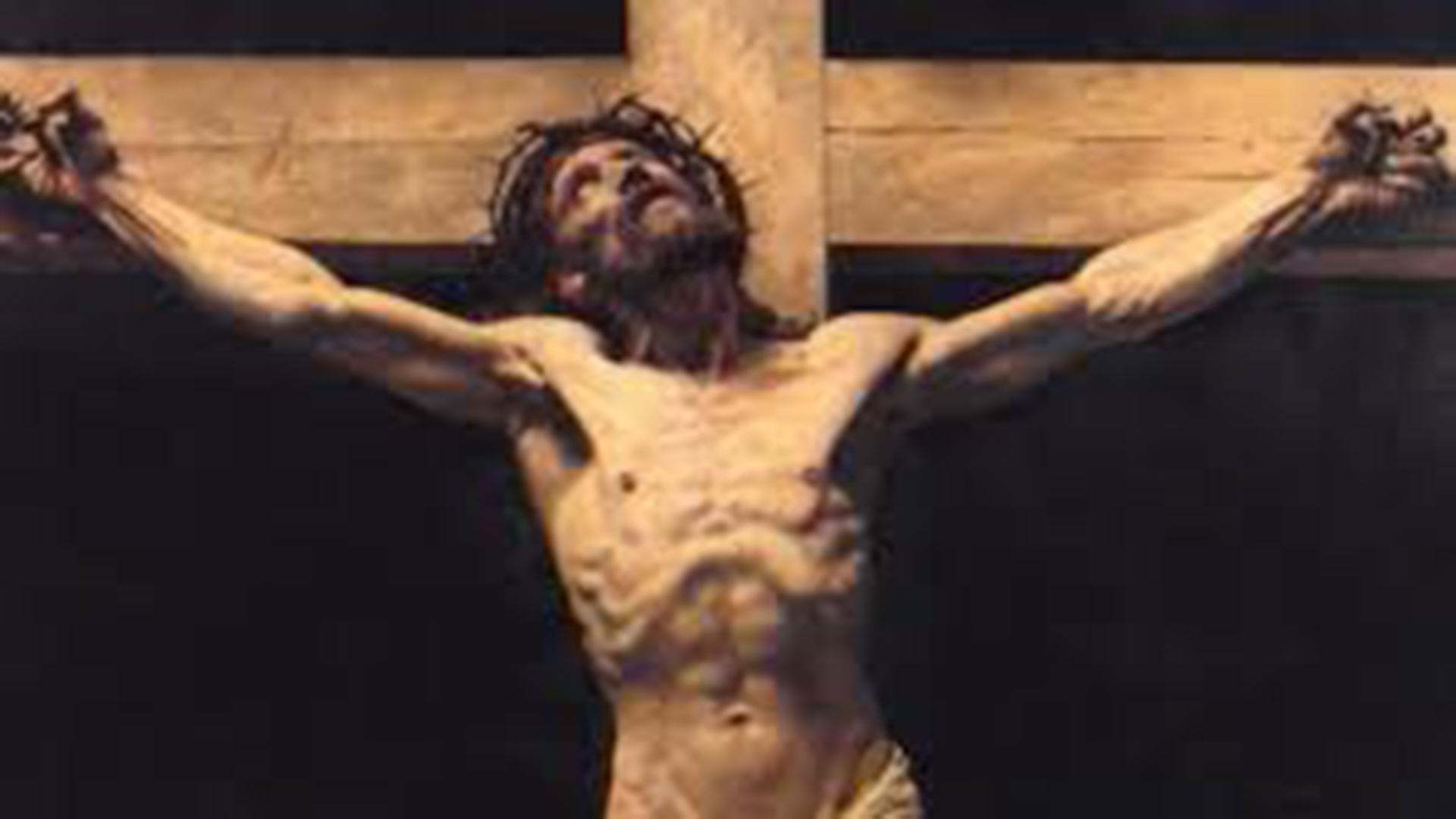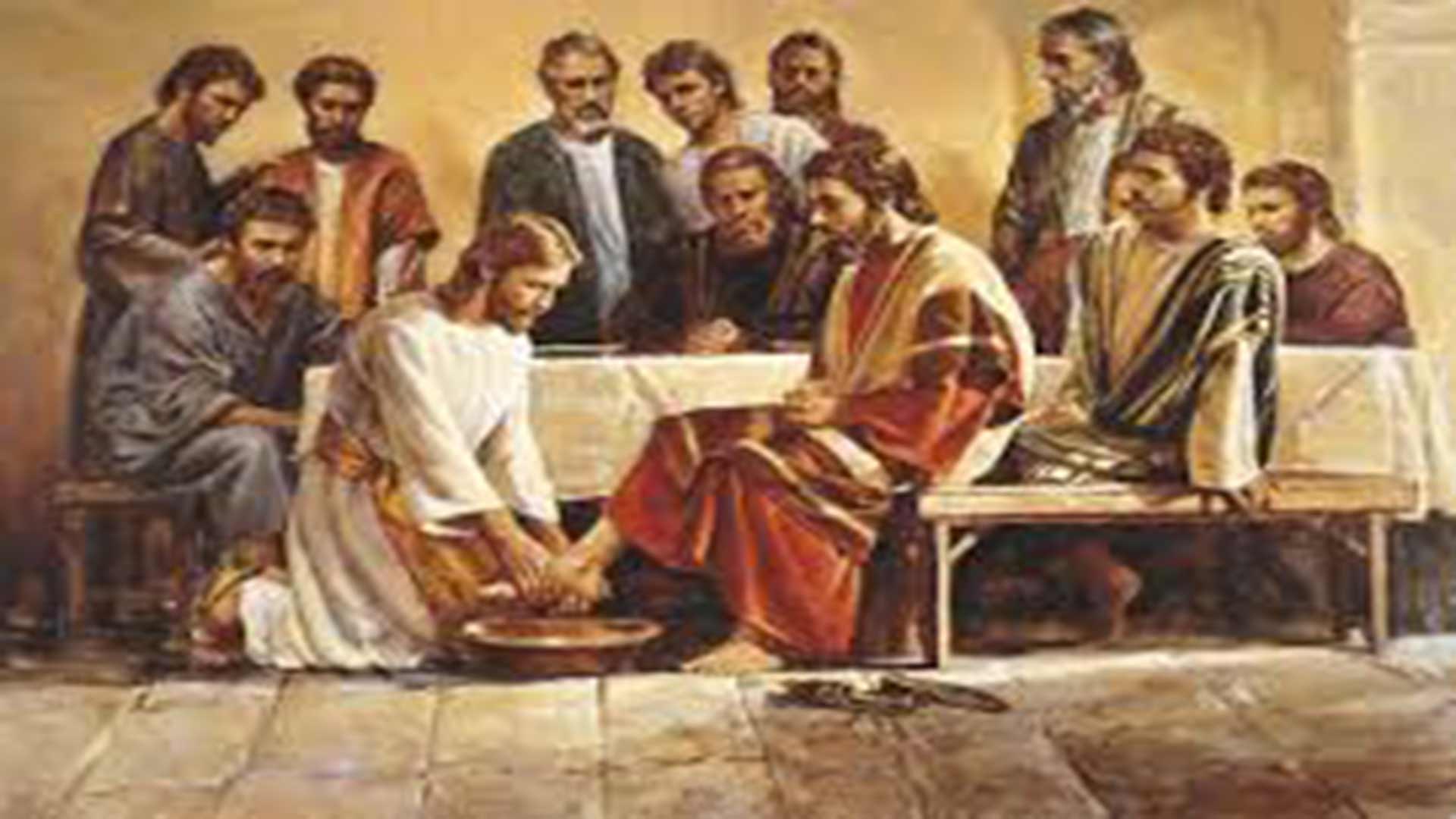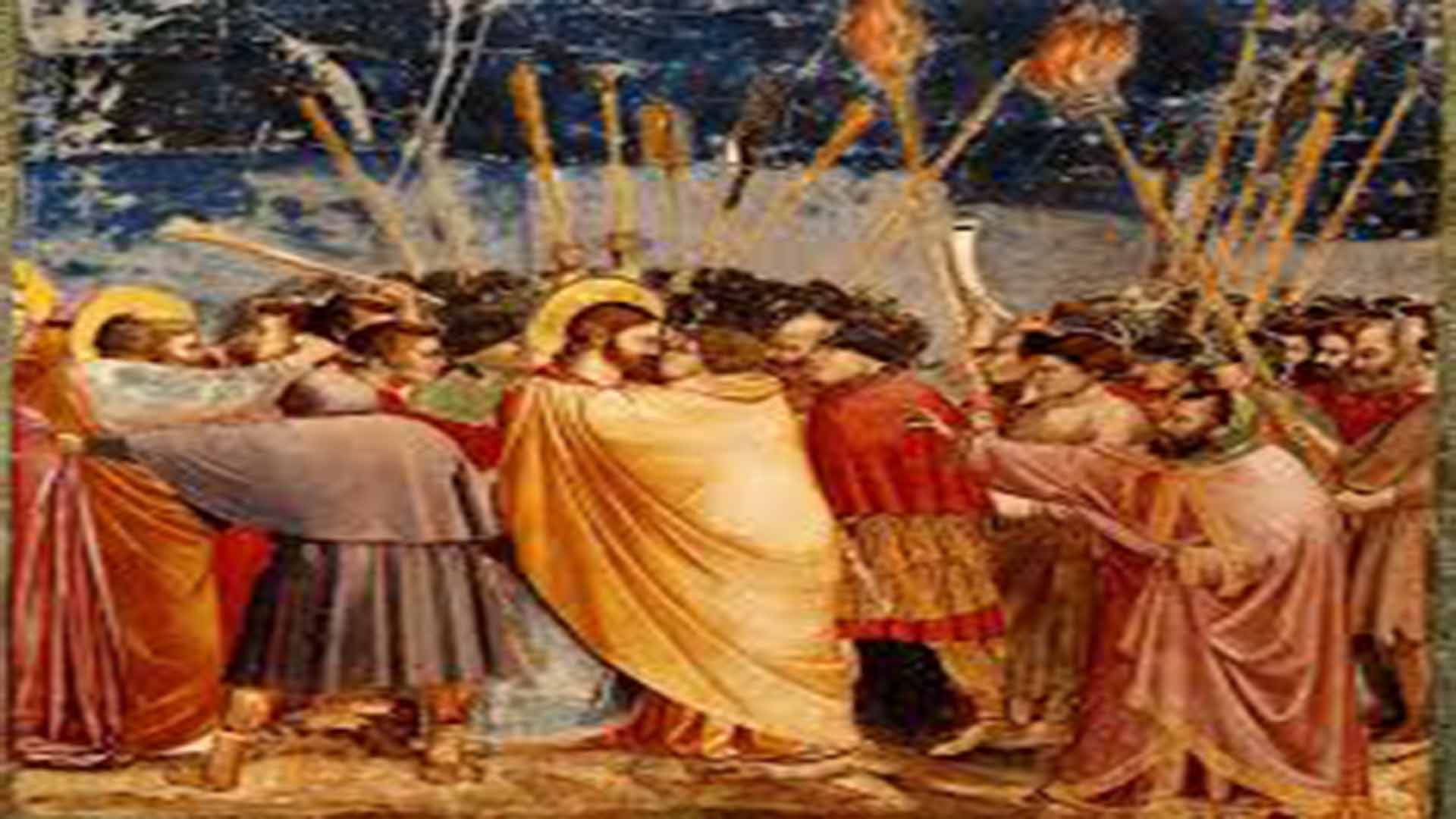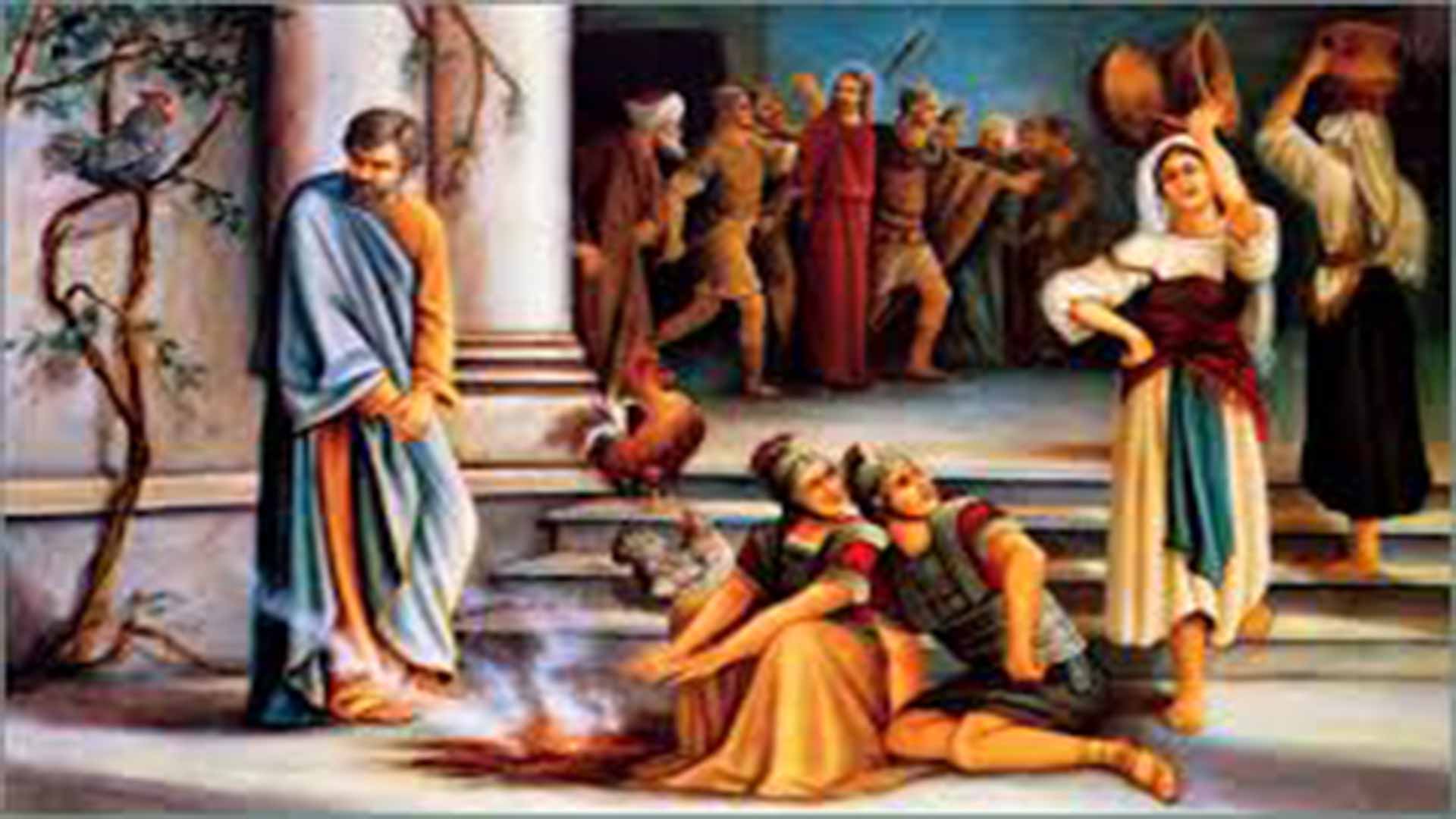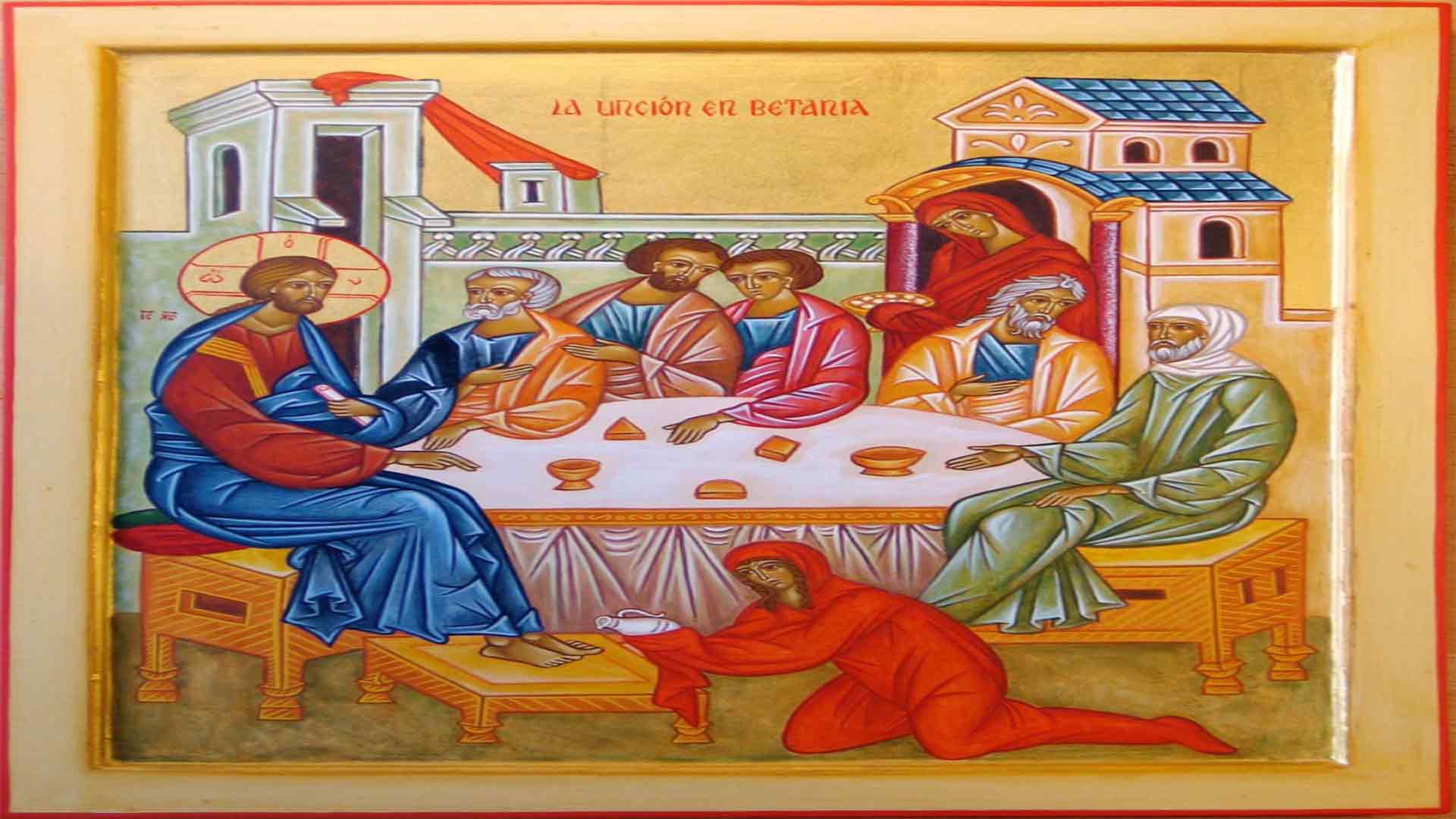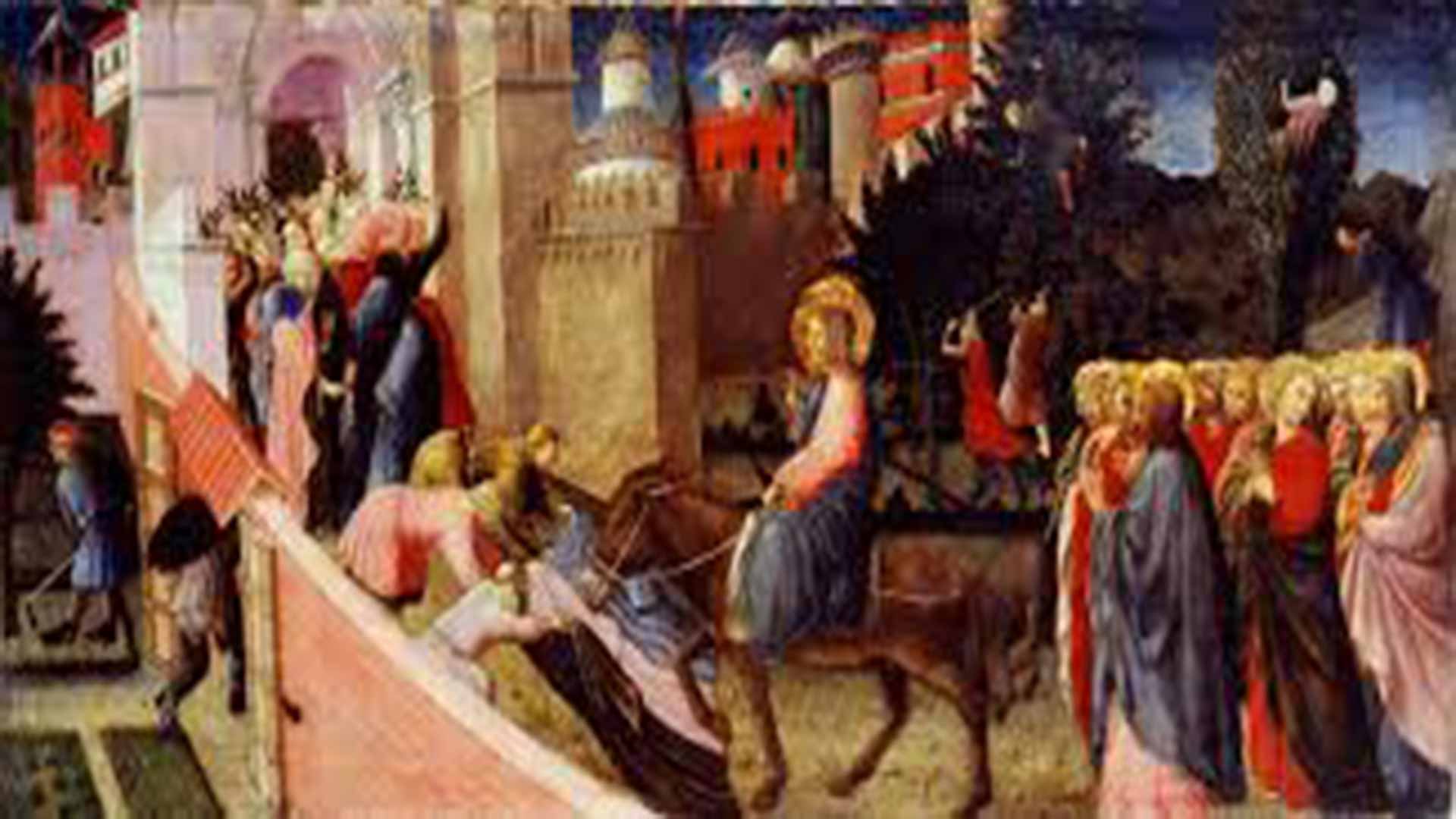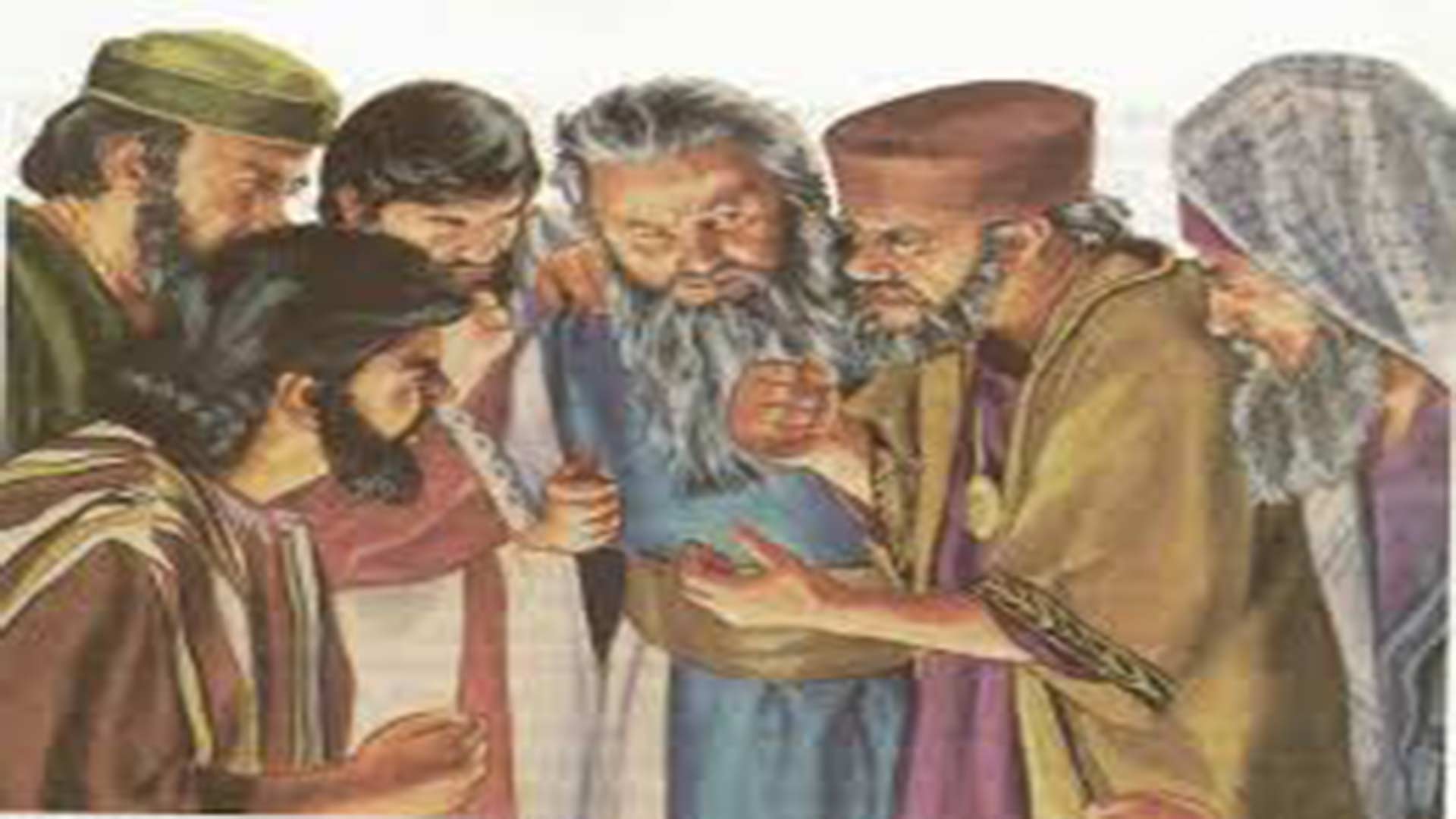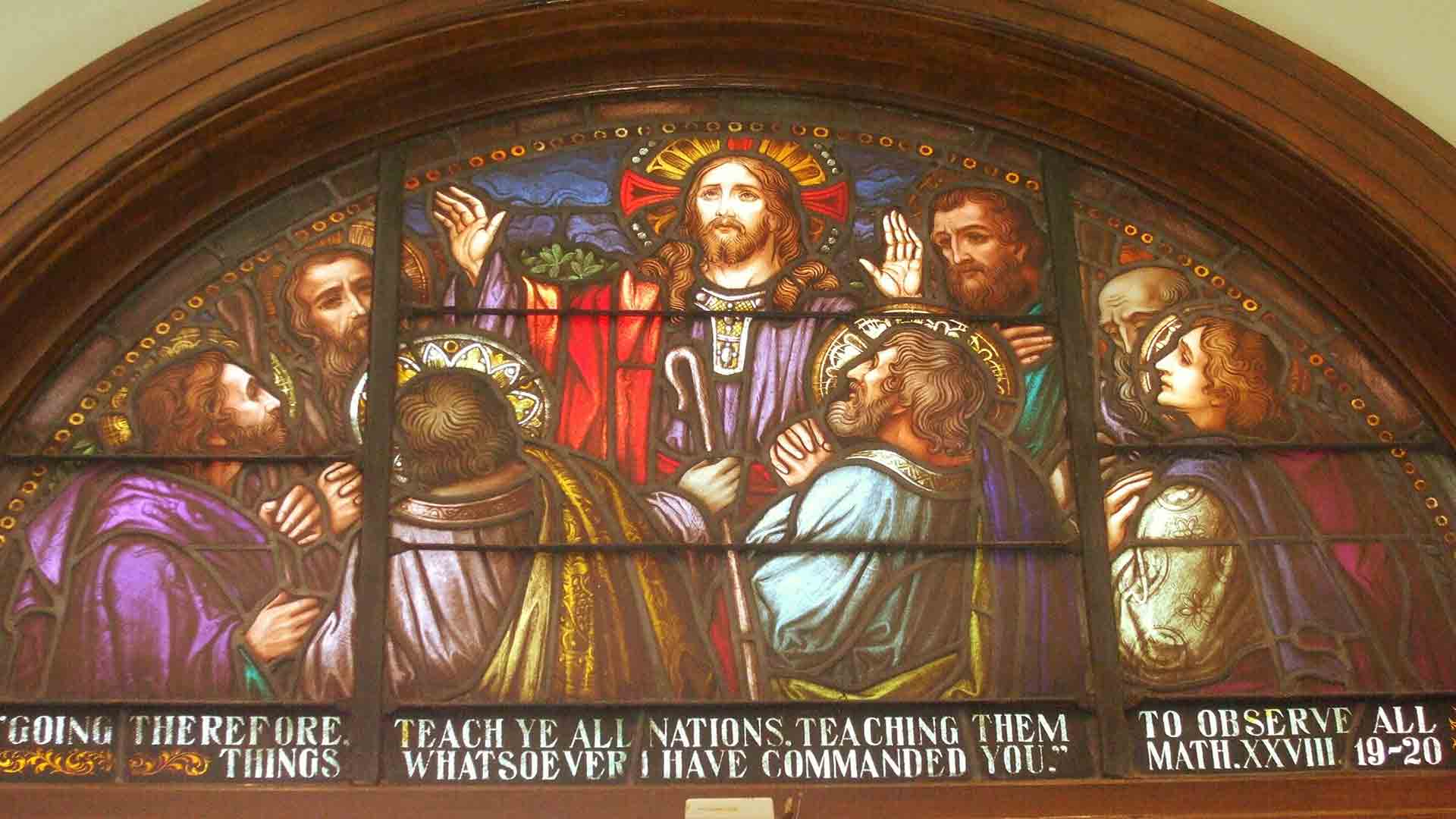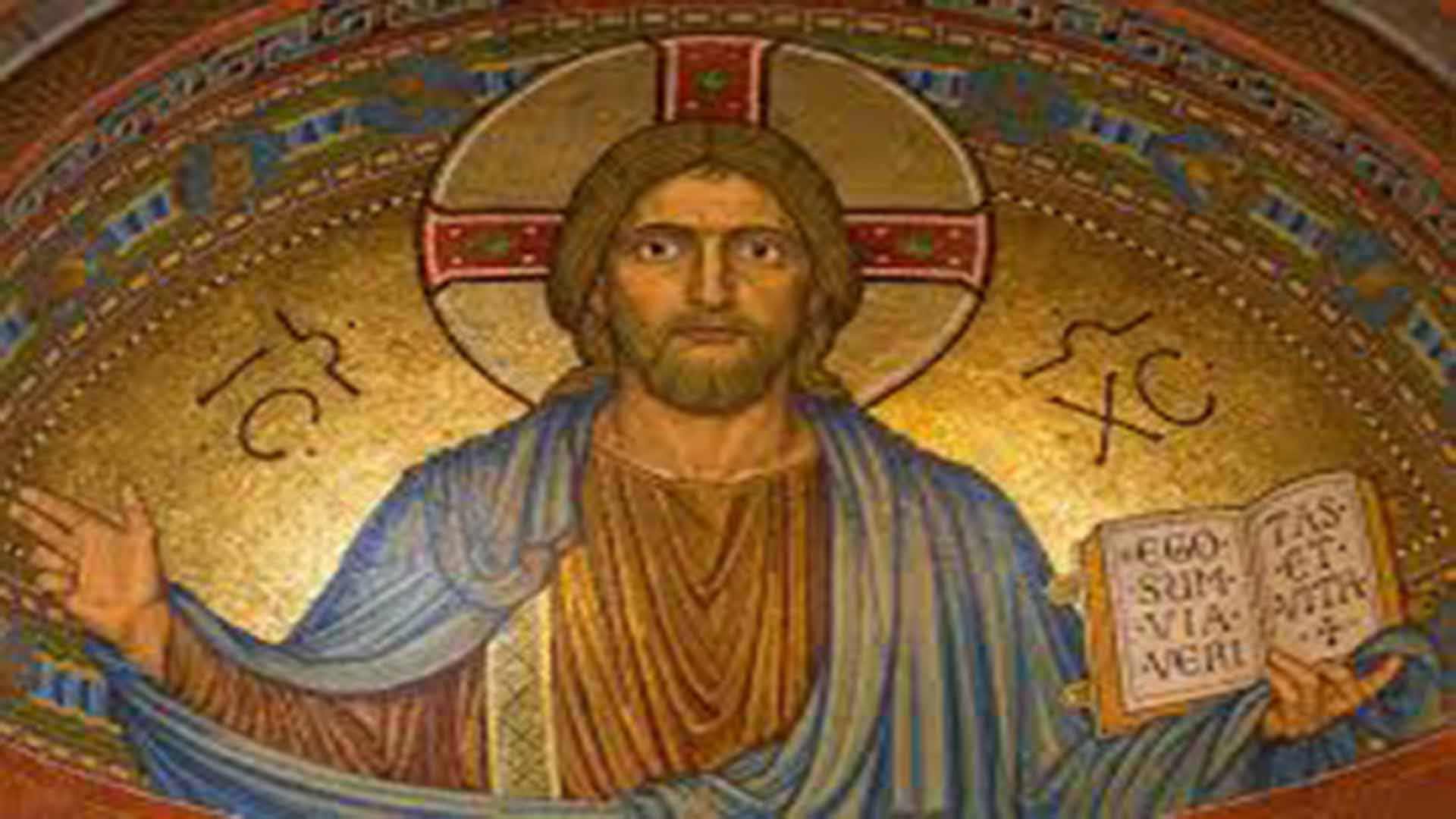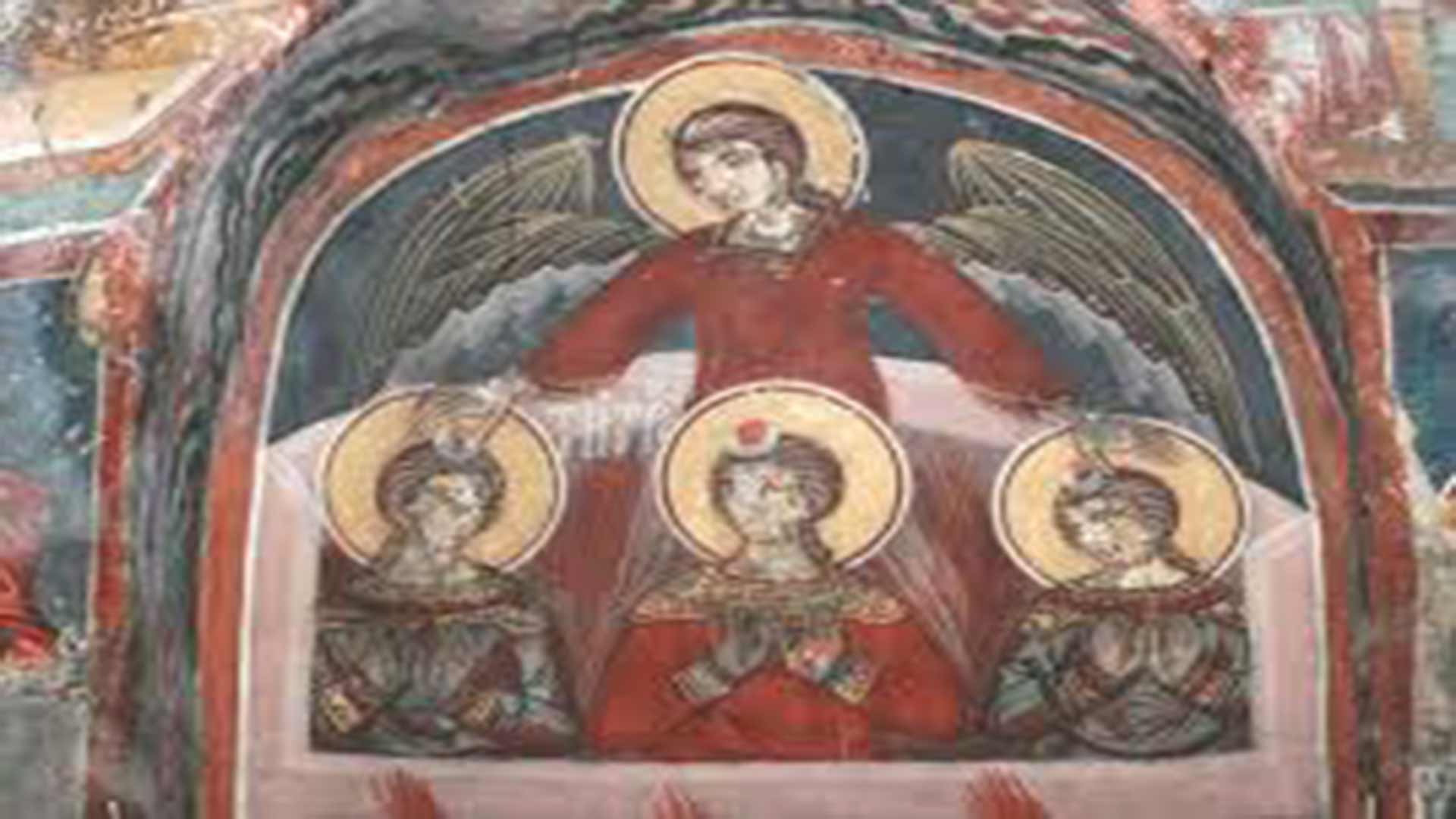Never again, my Lord!
LENT 2020 – Day 45
Readings: Is 52: 13-53, 12; Ps 30: 2.6, 12 13, 15-16 17.25; Heb 4: 14-16, 5.7-9; Jn 18: 1-9, 42
Isn’t it amazing that the saga of Jesus Christ was charted eight centuries before the coming of the Messiah? In the fourth Servant Song, Prophet Isaiah speaks of the One who God would choose to free His people from oppression. He would carry out His mission as Servant of God, in humility and pain. He would teach but they would despise and reject Him. With His appearance marred beyond human semblance, this man of sorrows would carry our sorrows. He would be wounded not for His sins but for ours; He would do no violence nor show deceit, yet He would be punished; He would not utter a word but let Himself be taken like a lamb to the slaughter. The punishment He would bear would heal humankind, and God would exalt and lift up the Servant.
St John the Evangelist, the favourite disciple of Jesus who most closely lived His Passion, captured it all so vividly. The Son of God was indeed despised and rejected, denied by one of His own, Peter the Rock, and betrayed by another, Judas Iscariot. As this was also the theme of the Gospel according to St Matthew on Passion Sunday, today let’s focus on the crux of Good Friday: the unfair trial of our Lord which led to His death.
The Jewish authorities put forth religious motives justifying the death of Jesus. However, the Jewish leaders had powers to impose only flogging and prison, not death. By making Jesus look like a political conspirator, they took Him to Pontius Pilate, the Roman governor of Judea. It was a flimsy accusation, Pilate learnt, yet he told the people to judge Him according to their law. He proved an ineffectual, vacillating man. Even after Jesus clarified that His kingship was not of this world, Pilate lacked the courage to face the crowd whom the Sanhedrin chiefs had instigated. The Messiah touched a raw nerve in Pilate when he said, “I have come into the world to bear witness to the truth.”
Then, perhaps in jest, Pilate famously said, “What is truth?’ His own rhetoric shook him out of his complacency at least temporarily. He went out to the Jews again and told them, “I find no crime in Him.” But soon thereafter this weak and pliable judge washed his hands off the gross injustice that the mob wanted to mete out to the most just man on earth. He consented to HIs crucifixion, as demanded by the rabble outside his palace. Through all of this the only act to which Pilate did not bend was to change the title “King of the Jews” that he had already put down. Thus, unwittingly, he who had earlier said, “So you are a king?” now crowned Jesus who had then answered, “You say that I am a king.”
We see that Pilate who had power to save Jesus proved powerless, simply because he wanted to save his skin. And so did the chief priests: didn’t they bend over backwards when they said, “We have no king but Caesar”? While they showed their true colours, suffering did not overwhelm Jesus. Very dignified, He went ahead to meet His death. And when He reached the appointed place and hour, one of the crucified criminals, with a humble and repentant heart, did what the learned and vicious of Jewish society did not have the gumption to do, that is, acknowledge that Jesus is God.
In this picture of desolation, three Marys stood at the foot of the Cross: Mary, the mother of Jesus, and his mother’s sister, Mary the wife of Copas, and Mary Magdalene. Women, the less powerful and voiceless in Jewish society, comforted Jesus every step of the painful way to Calvary. We also know that the meek and simple Simon of Cyrene shared the burden of the Cross for a while, and finally an old and secret disciple Joseph of Arimathea took charge of the body of Jesus and laid it in an absolutely new tomb.
St John’s Gospel passage should convince us that this was the most unfair trial in history. Injustice was meted out to the long-awaited Messiah. About this we have to be thoroughly convinced and refrain from being unfair to Jesus in our daily lives. Aren’t He and the Church often detested because they bear witness to the truth? And what do we do? We remain in our own comfort zones and wash our hands of it like Pilate. Isn’t our Lord mocked at and His laws struck down? And what do we do? We let Judases, Caiaphases and Pilates walk free and even rule over us.
Well, every time we fail to fearlessly defend Our Lord, we let Calvary be real in our own lives. But never again, my Lord! We who’ve been waiting for the Messiah for millennia now must say, Never again! He will soon rise from the dead and walk into our lives if we let Him do so. He is our high priest who can sympathise with our weaknesses. Let us with confidence, then, as St Paul’s exhorts us, “draw near to the throne of grace, that we may receive mercy and find grace to help in time of need.”
The Lord calls us to love one another
LENT 2020 – Day 44
Readings: Ex 12: 1-8, 11-14; Ps 115: 12-13, 15-16, 17-18; Cor 11: 23-26; Jn 13: 1-15
Maundy Thursday is the first day of the Easter Triduum. The readings of the Mass of the Lord’s Supper form a bridge between the historic liberation of the Israelites from slavery in Egypt and the final liberation of the world from the bondage of sin.
The reading from the Book of Exodus points to the origin of Israel as God’s Chosen People. The Lord commands that this month be the first of the year, in commemoration of the beginning of their liberation. He ordains on how to observe the Paschal rituals. These foster a feeling of religious community through the sharing of the paschal lamb. The staining of doorposts with blood of the expiatory lamb is the stamp of the divine that wards off all evil. Unleavened bread eaten in haste accompanied by bitter herbs is a symbol of the suffering from which the Israelites had fled.
When the twelve Apostles celebrated the Passover with their Master, they followed the traditional rite evoking the old covenants. It was also a thanksgiving for God’s many interventions to rescue the Israelites. What the Apostles did not realize, however, was that the Last Supper marked a new beginning. Jesus had anticipated Calvary where He would be presenting Himself as the paschal lamb, the Lamb of God. He did so mysteriously, by converting bread and wine into His Body and Blood. The Son of God made this supreme act of love so as to redeem the sins of humankind. The Holy Mass thus established became the bloodless Sacrifice of the New Covenant.
The Eucharist is a masterpiece of Jesus’ love, the best proof of His love for humankind. He made the Apostles participants in His Priesthood and ordained them to carry out that mystery. He gave them responsibilities and authority: to bind and loose in His name, to forgive sins, to transform the bread and wine into His Body and Blood. This the ordained priesthood would do infinite times, until the Lord’s return to the world. Their role is vital in helping the faithful to carry out their baptismal priesthood.
There was no better occasion than the Last Supper for the Lord to command His followers to love one another. He said, “A new commandment I give unto you, that ye love one another; as I have loved you, that ye also love one another. By this shall all men know that ye are my disciples, if ye have love one to another.” (Jn 13: 34-35) This new commandment is a summary of all of God's law and brings about the definitive liberation.
Speaking to the first Christians, St Paul reiterated that this liberation emerged when the Paschal Lamb, who is the Christ, was sacrificed. Given that we Christians aren’t always united in love, we must take seriously the reminder from the Apostle of the Gentiles: that the Eucharist and the Church – the Sacramental Body and the Mystical Body – are intimately connected. We should place ourselves at the service of our brethren, in humility and love, of which the washing of the Apostles’ feet by our Lord is emblematic. A Eucharist celebrated amidst division cannot be a sign that we are followers of Christ.
The time to be a person of integrity is now
LENT 2020 – Day 43
Readings: Is 50: 4-9a; Ps 68: 8-10, 21-22, 31.33-34; Mt 26: 14-25
The first reading from the Book of Isaiah is practically the same as that of Palm or Passion Sunday. Isaiah talks of his prophetic mission: of how the Lord spoke to him and how he went ahead with faith and courage. He accepted suffering with patience, always expecting the Lord’s help at the right moment.
Suffering is not always physical; very often it is of the moral order. This leads us to sever ties with unprincipled persons, which may even include family and friends. But can any suffering – physical or moral – be worse than what the Lord endured? No. We could therefore consider even our little troubles as our sharing in the Lord’s Cross.
The Gospel passage, which is just a tiny extract from the Sunday text, focuses on Judas’ betrayal which caused moral and physical suffering to the Lord. The place of action was the Passover meal that the disciples had prepared in accordance with instructions from their Master. As they were at the table Jesus saw the movement of His disciples’ hearts. Our Lord first saw the dishonourable act that Judas was going to perpetrate; He saw it even before the consummated the deal with the chief priest.
St Matthew tells us that after Judas had dipped his hand in the dish with Jesus, Satan entered the apostle’s heart. What Judas had actually envisioned only he and God know! Perhaps used to seeing things through the prism of money, here was an occasion to make a fast buck. But did he foresee the serious consequence of his action? Maybe he did. Or maybe he didn’t, for later he wished to retrace his steps. But it was too late to change.
We may not be at the level of the proverbial Judas but we too have failed our Lord. Even if we don’t commit a serious crime, abetment is bad enough. But knowing human nature, God instituted the sacrament of Confession, whereby we can reconcile ourselves to God and win back His grace and favour.
Getting to know Judas’ act at close quarters is surely a traumatic experience. It is a supreme lesson on one of the most painful experiences that one might experience in life. Betrayal often begins with small things: lies, compromises and opportunistic behaviour. If left unchecked by self, parents or other authorities, it grows into unfaithfulness in great things, or what we commonly dub back-stabbing. Lack of integrity that begins with the individual can infect an entire society. Thus public men in a Godless society soon become unprincipled and corrupt.
In all that we do, let’s strive towards the greatest level of integrity: loyalty and faithfulness to God and neighbour. “Whatever is true, whatever is honourable, whatever is just, whatever is pure, whatever is lovely, whatever is gracious, if there is any excellence, if there is anything worthy of praise, think about these things,” says St Paul in his letter to the Philippians (4: 8). This is sure to promote a welcome sweetness and an integrity that is pleasing to God by whom we are called into the fellowship of his Son, Jesus Christ our Lord (1 Cor 1: 9).
By His side, in His darkest hour
LENT 2020 – Day 42
Readings: Is 49: 1-6; Ps 70: 1-2, 3-4, 5-6, 15-17; Jn 13: 21-33, 36-38
The text of Isaiah’s second servant song speaks of his prophetic mission assigned by the Lord God. He has a message of great import for Israel: the Chosen People are to return to the right path and fulfil their vocation as light to the nations. Holding them in high regard, the Lord God urged them to accept and then take His message of salvation to the ends of the world.
Was it a tall order? Maybe it was, but then they could always rest assured of the Lord’s help. They had only to ask with expectant faith and success would be theirs. The Lord is always our refuge, our justice; He pays heed and saves us. The Lord is our rock, a mighty stronghold. He is our hope, our trust, our help. Every person that has tasted of the Lord’s generous hand will tell of His justice, of his help; his heart will overflow with the Lord’s teachings and His mighty wonders.
What, then, was the problem with Israel? Theirs was indeed a long and sad story. They failed to appreciate the marvels and settled on trinkets. Busy with their petty lives, by and by they forgot the Lord God. They set aside the covenants and began to do their own thing. Their lack of earnestness in God’s things soon gave way to flouting His commandments. The Israelites had long taken the Lord for granted, and they finally paid the price.
Let’s face it. They betrayed the Lord… much as we do when we feign ignorance of our religious duties or are busy with our other duties. We do so because it suits us at that moment. But then, it’s not God who needs us; we need God. He is infinitely powerful and all is grist that comes to His mill. When Judas leaves the scene, Jesus talks freely to His reduced but true flock. He waxes eloquent – “Now is the Son of man glorified, and in him God is glorified; if God is glorified in him, God will also glorify him in himself, and glorify him at once.”
Meanwhile, Jesus is in the goodbye mode: He is going back to the Father who will glorify Him very soon. He also has words of encouragement and consolation for the Apostles and for those who thirst for the living water. Not that He has any dreamy notions about men and women: He knows that we are prone to deny Him – like Peter who disowned Him at His most grievous hour. It’s not that He needed Peter; legions of angels could have come to our Lord’s rescue at that moment. It’s just that He wanted Peter to side with Him… But, of course, Jesus knew the difference between Peter’s moment of denial and Judas’ cold-blooded betrayal.
He wants us to be by His side; He wants us the warmth of our presence; Jesus wants us to be there – for Him – in His darkest hour. And why so? So that He can then pay us back a hundredfold, as is His wont… So let’s never forget the love and faithfulness of the Lord and ask for His grace, by saying, “The Lord is my light and my salvation.”
The fragrance of our greatest possession
LENT 2020 – Day 41
Readings: Is 42: 1-7; Ps 26: 1.2.3.13-14; Jn 12: 1-11
The first reading is taken from the first of the four ‘servant songs’ or ‘Songs of the Suffering Servant’. It is not easy to identify the figure: is it the prophet himself, or historical Israel, or the ideal Israel? From the New Testament we know it is Jesus Christ. Its first verse is reminiscent of the voice of the Father at the Baptism of Jesus and the Transfiguration on Mount Tabor. The seventh verse takes us to the Gospel passage in Luke, chapter 4: 18. In this Jesus says that the Father has sent Him to proclaim liberty to captives, sight to the blind, and to let the oppressed go free.
Only a psalm can cap all those wonders, a psalm that is at once a song of praise and thanksgiving: “The Lord is my light and my help… the Lord is the stronghold of my life.” There is therefore nothing to fear; only in Him we should hope. And we continue to see wonders in the countdown to the Lord’s appointed hour on earth. They witness to the Lord’s goodness throughout the week.
The day following the spectacle that was Palm Sunday in Jerusalem, Our Lord stayed in Bethany. He is said to have spent the night at the home of Lazarus. The family probably hosted Him and His disciples through the week. A great multitude of Jews visited Him there, also eager to know the man whom Jesus had raised from the dead.
Those were indeed live-giving encounters. Another happened when Lazarus’ sister Mary proved herself an exceptional hostess to a divine guest. While her sister Martha took care of the daily chores, Mary fell at the feet of Jesus. She took a pound of costly ointment of pure nard and anointed His feet, which she then wiped with her hair.
Did she exceed her role as hostess? Well, nothing is too much for the Lord. She did something that no Jewish woman would dare do: she loosed her hair before Her Lord, thus expressing love and dedication. An eye-opener to all of us who fear to be different, especially when it comes to Godly things…. Aren’t we worried about what others will say and think of us?
But look who took objection to Mary’s magnanimity: none other than Judas Iscariot. The miserable soul that was to sell Our Lord wanted to first sell the ointment, ostensibly to gather money for the poor! Well, the evangelist is very clear: “This he [Judas] said, not that he cared for the poor but because he was a thief, and as he had the money box he used to take what was put into it.” The fact that Jesus despite knowing his base instincts accepted him as a disciple goes to show His concern for the well-being of his soul than for that of the common purse.
Fact is, “he who is faithful in a very little is faithful also in much; and he who is dishonest in a very little is dishonest also in much.” (Lk 16: 10) This fits Judas Iscariot like a glove. And that’s why Jesus soon hints at His death, in which Judas would soon have a dishonourably decisive role to play. “Let her alone,” says He, “let her keep it for the day of my burial.” And He adds: “The poor you will always have with you, but you do not always have me.” Yes, very often the poor are only a ruse; it’s usually ourselves that we are concerned about.
Sometimes don’t we seem greatly concerned about our little possessions and little concerned about our greatest possession in Heaven? Don’t we fall at the feet of our earthly masters but are only too proud to pray to the Lord? Whereas we set our eyes on the temporal, we let the eternal surprise us only at the time our death! Instead, like Mary of Bethany, let's set our hearts not on saving the ointment; with love and gratitude, let's spend everything on the Lord and save our soul.
Our Lord's saga of pain and suffering begins
LENT 2020 – Day 40
Readings: Is 50: 4-7; Ps 21: 8-9, 17, 18a, 19-20, 23-24; Phil 2: 6-11; Mt 26: 14-27, 66
The first two readings are a prologue to our Lord’s saga of pain and suffering described in the Gospel passage. Eight hundred years before Christ, prophet Isaiah anticipated the happenings on Calvary; and a millennium before Him, His ancestor King David wrote the haunting cry that the Christ crucified would utter: “My God, my God, why hast Thou forsaken me?” St Paul highlights the fact that the Son of God speaks here as “a servant, born in the likeness of men.” He underscores the humility and love with which our Lord looked at His earthly mission.
Today is commonly known as “Palm Sunday”. The evangelists have passages fit to commemorate this Sunday. Yet, the overarching theme of our Lord’s Passion takes precedence on this day, alternatively called “Passion Sunday”.
St Matthew portrays more than the story of a single day; he gives an overview of the first six days of the Holy Week. Accordingly, the passage comprises the entry of Jesus into Jerusalem on Sunday; His Passion on Thursday and finally His Death on that fateful Friday. However, in real time, Jesus’ last week on earth was packed with many other events as well. All together they precipitated the final meltdown, which soon became a watershed in world history.
With St Matthew as our guide
Let’s walk with St Matthew to see the places that Jesus visited, and why. Let’s also look at the personages that Jesus encountered on the way. They make up an eloquent portrait gallery in which you and I are sure to meet our human types.
When Jesus entered Jerusalem, He met an ecstatic lot. They spread garments and tree branches on the road, and shouted “Hosanna to the Son of David!” The city was stirred with the visit of “the prophet Jesus from Nazareth of Galilee”. Was this for real? Had Jerusalem accepted Him as their long-awaited Messiah? Well, this sudden switch of sentiments, this picture of innocence and goodness, seemed too good to be true. Thanks to human chemistry, an equal and opposite reaction gets underway in the minds and hearts of others following Jesus’ moves.
If the cheering multitude was naïve in its enthusiasm, so were Jesus’ disciples in their lack of fervour. On Thursday, they simply followed His instructions and arranged the Upper Room to hold their supper. Perhaps to them it was just another yearly feast. Did they understand what Jesus meant by saying that He would meet them again only “in my Father’s kingdom”? Ironically, only Judas Iscariot perhaps did, for he’d already conspired to sell his Lord for thirty pieces of silver.
That Wednesday night Jesus went out to the Mount of Olives to pray. He knew that His time was at hand. And knowing His sheep, too, He foretold that striking the shepherd would scatter them. To them it meant very little. Humans like us, lost in their own preoccupations, Peter, James and John fell asleep at three crucial moments. Curiously, here we see the human facet of Jesus too. Left to fend for Himself, he cried to His Father to let the cup pass if possible.
However, the human side of Jesus was soon superimposed with His superhuman dignity. When the kiss of betrayal brought in the hour, Jesus addressed Judas charitably as “friend”. And when someone cut off the ear of a soldier who had come to arrest Him, Jesus healed him instantly. What might the soldier have felt at that moment? What did he do thereafter: convert or continue his evil doing? We do not know. What we know, meanwhile, is that the disciples, the greatest beneficiaries of the magnanimous Jesus, took to their heels. What would we have done? And what do we do in the circumstances of our life today?
Next we meet old Caiaphas, yet another picture of human viciousness. He entertained a string of false testimonies. Then came the tipping point. Two witnesses reported that Jesus had declared that He could destroy the temple and rebuild it in three days. It no doubt crossed Caiaphas mind that Jesus was the Messiah but he didn't hail Him. Instead, he turned the tables on Him, crying “Blasphemy”, for which death was the punishment.
Jesus was next in the presence of Pilate, the governor. Here was a typical political figure playing to the gallery. He washed his hands and said, “I am innocent of this righteous man’s blood.” Why did he leave it to the populace to decide when he should have called a spade a spade? These are the undecided and/or the unconcerned who do everything only to save their skin…
At the praetorium, the stage was set for the final tragic act. Here we meet mockers. They stripped our Lord, and in disdain hung a scarlet robe over his body and a crown of thorns on his head. For a change, a man called Simon met Jesus as He wended his way to Calvary. Although they ordered him to help Jesus carry the Cross, he most likely did it with a measure of sympathy for the suffering Lord. Can we, like that Cyrenian, offer up our little sufferings as a humble participation in the carrying of the Cross?
At Calvary the ‘good thief’ said a good word to the dying Lord; he instantly merited Paradise. This goes to show that it’s never too late to convert. However, it’s better to be safe rather than sorry; we shouldn’t test God, as did Judas Iscariot, who stupidly lost his life in a shameful death.
After Jesus had died on the Cross, an old disciple, Joseph of Arimathea took charge of His sacred body. He wrapped the body in a clean linen shroud and laid it in his own new tomb. Like him, we too can help out, by rendering our services to the Bride of Christ. After all, the Church, which our Lord rebuilt on the third day, is the best repository of his memory. The Church also holds His three best gifts for humankind: first, the Holy Mass, held there every day as an unbloody enactment of the Holy Sacrifice on Calvary; second, the Priesthood, which He instituted as a sacrament of the New Covenant; and third, the commandment of love, a supreme example of how Jesus perfected the old law.
Our Lord Jesus Christ thus left us an invaluable heritage whereby we can become worthy candidates for eternal salvation. We will thereby vindicate His coming to the world.
When man was wolf to God
LENT 2020 - Day 39
Readings: Ezek 37: 21-28; Ps Jer 31: 10, 11-12ab, 13; Jn 11: 45-57
Why does the Lord God say "I will make them one nation"? Israel started off as one nation comprising twelve tribes descending from Jacob (whom God renamed Israel). Later, when the people desired a king like the nations around them, God chose Saul as the first king of Israel. However, as a result of Saul's sinful life his family lost the right to reign. Then God chose David to succeed him but only Judah accepted the choice; the other tribes of Israel followed Saul’s son Ishbosheth. A war ensued.
David, the stronger of the two, worked hard to reunite the tribes. At long last, they welcomed him as king of “all Israel and Judah”. His son Solomon followed suit, until a day dawned when he began disobeying God. When his son Rehoboam failed to keep the kingdom united, a new split ensued. God chose Jeroboam, a servant of Solomon, to head the northern kingdom. Eventually, this kingdom fell to the Assyrians the the other to the Babylonians.
This is the time when the prophet Ezekiel lived. Seeing that His people had gone astray, God could well have withdrawn and pronounced national destruction. But He was faithful to His covenant and loved His people. So He made known a new blueprint for Israel: it would be a single country under a revived Davidic dynasty, a united people, safe under the protective umbrella of the Lord God. The only condition was that the people "shall not defile themselves any more with their idols and their detestable things and with any of their transgressions." Cleansed of their defilement, they would be a new people.
We know that before God sent Jesus to the world, He had brought back the captives from Babylon but soon thereafter the country under the heavy hand of the Roman administration. Why God allowed this is a mystery. Did the sins of certain people lead to this fate, or was it God waiting to unfold the grand history of our redemption? This role the Father had assigned to Jesus. But, alas, His countrymen twisted His intentions and misinterpreted His works.
The astounding miracle of raising Lazarus from the dead is a case in point. Soon after Jesus had worked that wonder, many of the witnesses reported it to the Pharisees. So the chief priests and the Pharisees gathered the council. They deliberated that if the people began to believe in Him, the Romans would come and destroy both the holy place and their nation. So they decided to put Him to death.
Very significantly, the chief priest Caiaphas proposed that Jesus should die "not for the nation only but to gather into one the children of God who are scattered abroad." Caiaphas thus unwittingly prophesied the investiture of Jesus as the High Priest of the New Alliance, and became the last of the high priests of the Old Covenant. No doubt, great was the price that Jesus paid: he sealed it with His own blood.
This is the beginning of the end of Jesus' life on earth. He no longer went about openly among the Jews but into the wilderness, to a town called Ephraim, where he stayed with his disciples. Since the Passover was at hand, many wondered if Jesus too would go to Jerusalem for the feast. He did go... and, lo and behold, he had a reception fit for a king. Indeed a dramatic turn of events. But the question is: will He be crowned? Or will He be king just for a day?
O flickering human mind! O false promise from glib cheerleaders! It is easier to believe that these cheers will soon turn to jeers. And so it was. The chief priests and the Pharisees had already given orders that any one knew where Jesus was should let them know, so that they might arrest Him.... Homo homini lupus? Not just. Man was indeed wolf to God.
As 21st century apostles, we too have to walk the talk
LENT 2020 - Day 38
Readings: Jer 20: 10-13; Ps 17: 2-4, 5-6, 7; Jn 10: 31-42
It's unbelievable how a prophet too has to undergo trials and tribulations like we do. Jeremiah describes his own so dramatically that some have called him "the weeping prophet". God had called upon him to prophesy and he did respond with a great sense of commitment. He spoke loud and clear of Israel's unfaithfulness to the laws of the covenant, as a result of which the kingdom would face famine; invaders would plunder Jerusalem and exile the people to a foreign land.
The text of the first reading is the last of Jeremiah's so-called confessions. It is in this one that he best translates the drama of his prophetic ministry. It is even as though Jeremiah suffers from a persecution complex; his accusations sound like the ramblings of a paranoid. But soon there is an overflow of ardour for God - "the Lord is with me as a dread warrior"- and his fears vanish into thin air. Truly, if God be with us who can be against us?
The sufferings of the Son of God weren't less agonizing. The Jews subjected our Lord to physical violence and verbal abuse. Whenever Jesus quoted the Scripture to assert His identity, some seemed ignorant or apathetic to His discourse. Of course, those in the know, like the rabbis and other learned men, deflected His arguments. So Jesus now expected them to judge Him at least by His good works. The populace didn't formally deny these but meanwhile charged Him with blasphemy, for which the Mosaic law prescribed death.
In a cutting rejoinder, Jesus quotes Psalm 82, in which God upbraids some judges for their unfair judgements, saying, "You are gods, sons of the Most High, all of you". Jesus' point is that if this psalm calls them gods and sons of God, why won't God also call Him so whom He sanctified and sent into the world? But then, who can compel others to believe? Jesus revealed that He was God, but though they had ears they didn't listen to the revelation of the mystery of the Incarnate God.
That wasn't all. Since the testimony of Scripture didn't work out, Jesus returned to the argument of good works: "Though you do not believe me, believe the works." He knew that this would eventually take them to the Father in whose name Jesus accomplished those works. Besides, it is said that against facts there are no arguments. But still to no avail. The Jews stupidly rejected both His words (the Scriptures) and His works (prophecies and miracles), thus proving beyond doubt that they had closed minds.
Jesus worked yet another wonder. Although they'd sought to arrest Him, He escaped from their hands. And what's more, He did not stop preaching. There were others who needed Him, others ready to accept Him: those whom John the Baptist had prepared to accept Jesus were now waiting for Him across the Jordan. They remembered with nostalgia the truths of the faith that their catechist had taught them. They realised how right he was about his cousin Jesus Christ, and many believed in Him there and then.
So what is the take-away for us twenty-first century apostles? One, that a seed that is sown will one day bear fruit. The apostolate of presence is a great reality: if we show our readiness and do our best, God does the rest. Second, we should not feel discouraged or tire of doing our duty, in word or deed. Third, deeds are more eloquent than words. Or, according to a much-quoted adage attributed to the Italian saint Francis of Assisi: "Preach the Gospel always, and if necessary, use words." Well, se non è vero, è ben trovato! The long and short of it is that we have to walk the talk.
How do we know that Jesus is the Messiah?
LENT 2020 – Day 37
Readings: Gen 17: 3-9; Ps 104: 4-5, 6-7, 8-9; Jn 8: 51-59
The Jews of Jesus’ time swore by Abraham, from whom came the Chosen Race. However, they followed him more in letter than in spirit. When Abram became Abraham as part of the covenant that God had renewed with him, the Almighty promised to make him the father of a multitude of nations. He also expressed His desire to establish “an everlasting covenant” with Abraham’s descendants and to continue as their God. Finally, God promised them all the land of Canaan “for an everlasting possession”.
Understandably, change of name was a testimony to God’s promise and the patriarch’s new mission. But what are those “nations”? We know that Israel is the only nation that has descended from Abraham; so we may interpret “nations” here as the children that Israel would have produced spiritually had they followed God’s command in letter and spirit.
It’s a pity that, by rejecting the Messiah, Israel let go the great spiritual opportunity they had to be the Chosen Race. Finally it was Jesus who announced the Good News directly to the peoples of the world and became the Light of the Nations. By that rejection they unwittingly relinquished the land of their sojourning, “all the land of Canaan, for an everlasting possession”. Some say Canaan took the name of the grandson of Noah, a pre-Israelite land whose people had moved away from the Lord and whom He therefore moved into captivity. Thus, those who had foregone their spiritual duties forfeited the temporal blessings.
Jesus’ contemporaries in Israel were stuck in a rut. They took exception to our Lord’s statement that anyone who keeps His word “will never see death.” Jesus was talking about death by sin, which takes us to eternal damnation. Wasn’t it disturbing that quite a slanging match followed? The fact is that the people couldn’t understand the meaning and significance of what Jesus was saying to them. On the other hand, to Jesus, His identity was at the core of His message. Those who didn’t understand where He came from would not understand who He was and the purpose of His coming. No wonder they saw in Him a demon; they couldn’t figure out how He could be greater than Abraham!
How would you and I have reacted had we heard Jesus speak in that manner? It would depend on our world-view. We would have reacted positively, if we had known the true God and walked in His ways. Jesus fit the old Scriptural descriptions of the Messiah that the country was waiting for.... On the other hand, the rabbis and others who knew this well considered Him a thorn in their side. Many others thought the Messiah would be a political heavyweight who would free them from the Roman domination. Yet others fell into the temptation of judging based on externals. It was wrong on their part to say Jesus wasn’t yet fifty to “know” Abraham.... Before the patriarch of the Jewish people was, Jesus Is!
Can you and I now be sure that Jesus is indeed the Messiah? We surely can, for as the scientist, inventor and theologian Blaise Pascal said, “We know the truth not only by the reason, but by the heart.” Jesus brings us a unique, well articulated life-giving message. We can also judge the tree by its fruits - the many miracles of Jesus, especially the raising of the dead and His own Resurrection. Or as the Book of Proverbs recommends: “Trust in the Lord with all your heart, and do not rely on your own insight. In all your ways acknowledge Him, and He will make straight your paths.” (3: 5-6)
Forging ahead resolutely
LENT 2020 – Day 36
Readings: Dan 3: 14-20.24-25.28; Ps Dan 3, 29-30, 31, 32, 33, 34; Jn 8: 31-42
The first reading is as interesting as it is chilling. King Nebuchadnezzar of Babylon was a megalomaniac king who had erected a statue of gold. Prophet Daniel’s three companions Shadrach, Meshach and Abednego, who administered the province on his behalf, did not turn up at the official inauguration, as they were expected to. The monarch felt offended but gave them a fresh chance to show their respect, an offer that the trio rebuffed. They were ready to be thrown into the furnace, as per the king’s threat, but not bow to a cult image. Although they didn't plead with Yahweh to save them, they knew that He would. Or even if He didn’t, they would accept their fate in total resignation.
This is an apocryphal story whose sole purpose is to illustrate how God is all-powerful and rewards those who trust in Him. Not only did the trio escape totally unhurt, there was a fourth person keeping them company in the furnace. Nebuchadnezzar was convinced that it was an angel from above. Now in awe of Yahweh, he permitted the practice of the Jewish religion in his kingdom.
Not all Jews in Babylon, however, were like Shadrach, Meshach and Abednego. Many did worship false gods; they were polytheistic like the king himself. No doubt, back home, in Jesus’ time, the Jews did worship one God, according to the teaching of their first patriarch Abraham. They even made it a point to tell Jesus so. But for His part, the Messiah was pointing to their slavery to sin, and made a promise to deliver them from that scourge.
Well, if the people truly believed in Him, Jesus expected them to show their total allegiance. He reasoned as follows: “If the Son makes you free, you will be free indeed. I know that you are descendants of Abraham; yet you seek to kill me, because my word finds no place in you.” Jesus argued that killing him would mean going against Abraham, who always heard the Father and did what He commanded. In turn, the Jews insisted that they were not born of fornication (prostitution, that is, unfaithfulness to God), and that they had only one Father, that is, God.
The Jews, mired in their traditional way of thinking, were obstinate. They could not accept the fact that Jesus could speak about the Father in intimate terms. Hence they took Him to be an impostor, a man possessed, who spoke of not dying – when even Abraham had eventually died.... But that was how Jesus spoke the full truth, and nothing but the truth. He wouldn’t speak just what the people wanted to hear....
That puts a great onus on us. Let's reflect on whether our word is truly Yes, yes, or No, no. Or are wishy-washy and ineffectual? If the Lord finds us lukewarm or halfhearted, He will spit us out of His mouth. Hence He invites us to show enthusiasm, dynamism, and deep commitment to Him and His Church. Come then, let’s go forward together with our united resolve and strength.
